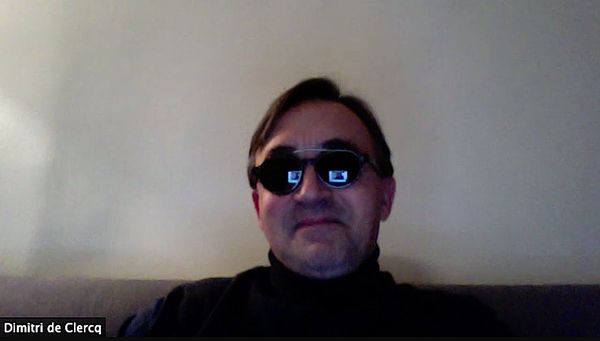 |
| Dimitri de Clercq on You Go To My Head: “A lot of the scenes are shot at the Malick hour, dawn or dusk.” |
Delfine Bafort and Svetozar Cvetkovic star in Dimitri de Clercq’s quietly disturbing, beautifully framed You Go To My Head, shot by Stijn Grupping (mostly at the Terrence Malick hour, dawn or dusk) in Morocco. His first directing experience was working with Alain Robbe-Grillet On The Blue Villa (Un Bruit Qui Rend Fou) after producing Ray Müller’s The Wonderful, Horrible Life Of Leni Riefenstahl (Die Macht der Bilder: Leni Riefenstahl) and Mathieu Kassovitz’s debut feature Café au lait.
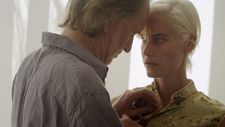 |
| Svetozar Cvetkovic as Jake and Delfine Bafort as Kitty in Dimitri de Clercq’s You Go To My Head |
You Go To My Head (co-written with Matt Steigbigel, Pierre Bourdy, and Rosemary Ricchio, and edited by Tobias Beul) smartly bookends with Chet Baker songs. Catherine Breillat’s longtime editor Pascale Chavance (Abuse Of Weakness, starring Isabelle Huppert; Bluebeard, based on Charles Perrault’s La Barbe Bleue; and The Sleeping Beauty combined with Hans Christian Andersen’s The Snow Queen) is thanked in the end credits.
Imagine a man who is enticed by the chance rescue of a woman who has lost her memory after a car accident in the desert. The ultimate shortcut to romance presents itself to him. He has the choice between honest courtship and dangerous pursuit. Many a story examines the intricacies of identity theft - from the Grimm Brothers’ The Goose Girl to Patricia Highsmith’s The Talented Mr. Ripley, to Mad Men’s Don Draper. But to switch the identity of another, unbeknownst to them, lifts manipulation to another level. De Clercq sharply explores the fantasy of erasing and then re-inventing someone else’s history, garnered by desire. Jake (Svetozar Cvetkovic), an architect living in an isolated de Chirico-like house and the woman he calls Kitty and his wife (Delfine Bafort), circle around a void of the past that never was.
From Paris, Dimitri de Clercq joined me on Zoom for a conversation on You Go To My Head. We began with his relationship to New York and Alain Robbe-Grillet.
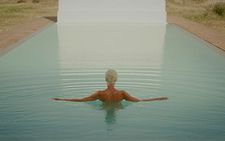 |
| Dimitri de Clercq on the influence of Leni Riefenstahl’s Olympia: “Maybe she was. Especially those moments by the pool. There’s a shot with Delfine diving into the pool.” |
Anne-Katrin Titze: In the 1990s you worked on a film with Alain Robbe-Grillet, The Blue Villa. Did any of those experiences inform how you were working on You Go To My Head?
Dimitri de Clercq: I don’t know, you know. I really consider You Go To My Head as my first feature film as a filmmaker. The Blue Villa (Un bruit qui rend fou) which was released in the States, opened at the Anthology Film Archives, where it played for two, three weeks. It got a very good review in The New York Times and some other American newspapers. It was funny, because following that release, Jonathan Demme asked to see the film. I had met Robbe-Grillet while I was a student at the Tisch School of the Arts and he was teaching the “New Novel” there at NYU and screenwriting classes. It was a lot of fun making that film together. But I see it more as a Robbe-Grillet film and I really went into his universe.
AKT: I only met Robbe-Grillet once, also at NYU at Maison Française. He kept asking me “What is Nietzsche’s Eternal Return in German?” I told him and twenty minutes later he asked me again. So my one encounter with Alain Robbe-Grillet was all about the Eternal Return.
DdC: He was quite a character. That was an interesting experience. Then I really mostly did producing until I decided to make this film a few years ago.
 |
| Kitty (Delfine Bafort) and Jake (Svetozar Cvetkovic): “With the house we were really working with white …” |
AKT: You filmed The Blue Villa on Hydra. It’s beautiful. I love this island.
DdC: Yeah, it’s a very special place. It’s an amphitheatre. I knew the place well. Actually the film was supposed to be set and shot in Asia, then for different reasons we were supposed to film in Cambodia. Then the insurance company, the completion bonds just wouldn’t cover anything because it was the time the country was opening and the Khmer Rouge was there and they didn’t want to guarantee the financing of the film. In the end I came up with the idea of shooting it on Hydra.
AKT: You produced a documentary on Leni Riefenstahl (Ray Müller’s The Wonderful, Horrible Life of Leni Riefenstahl). Was she in your head for any of the shots of You Go To My Head?
DdC: Maybe she was. Especially those moments by the pool. There’s a shot with Delfine diving into the pool.
AKT: Olympia!
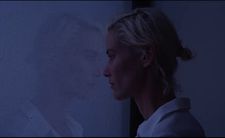 |
| Dimitri de Clercq: “In the film the progression of time is very important.” |
DdC: Yes, there’s the famous diving sequence in Olympia. I definitely had that in my mind when I did that. I wish I could have done more around that but we had very little time to film. I got to know Riefenstahl very well, thanks to Jonas Mekas in fact, who put me in contact with her. As you know, he had a high esteem of the films she made and so I just wrote to her. Originally when I wrote to her it was more the idea of having her make another film. I wanted to produce a Leni Riefenstahl film. When I met her in Munich, she was like “Listen, I’m an old woman. No one wants me to make another feature film. I’ve tried, it’s been impossible. But maybe, what about a documentary?” She was coming to the end of her life and she felt like it was time for her to say certain things.
AKT: For You Go To My Head, you start with Chet Baker and you end with Chet Baker. You begin with “I’m a Fool to Want You” and end with the title song. Were those choices made at the start - that you wanted to frame the story with the two songs?
DdC: That came later on, when we finished the last draft of the screenplay. I developed the idea of the script and a first draft with an American friend, Matt Steigbigel, who lives in New York and then I worked on all the other drafts with two writers in Paris, Pierre Bourdy and an American woman, Rosemary Ricchio. I had another title, which I forget now even what it was, and when Rosemary brought the last changes of the script to me in a café in Paris, she said: “Dimitri, you’re going to be really mad at me. I changed the title of the film.”
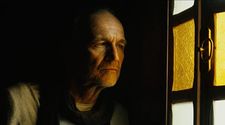 |
| Dimitri de Clercq: “I approached this film very much in a painterly fashion.” |
AKT: It’s a great title, although I have been having it lingering like a haunting refrain for a while now.
DdC: As soon as I saw the title, I said this is it. And with it came the song. What’s interesting about the songs is that at the beginning it’s a young Chet Baker singing and at the end of the film it’s one of his last recordings. And you can tell that his voice is just a different voice. To me it’s very moving. I had a different opening. That really came with the scene where you discover the lead actress in this dark space, lying on a bed up to the moment when she opens her eyes.
AKT: Apropos the young and old Chet Baker singing, The Met Costume Institute did a similar thing for their Camp: Notes On Fashion exhibition, with Judy Garland singing Somewhere Over The Rainbow. In the first rooms the young Judy Garland and in the later gallery space an older Garland. A lovely progression of time.
DdC: That’s nice. In the film the progression of time is very important. Also, to come back to what you were asking before, if there was something I could link to my working with Robbe-Grillet. There is actually one thing. The opening scene. If you look at every scene in the film, you really know who is looking. The only scene where you’re not sure whose point of view it is, is that opening scene. It’s also a scene you can’t really place in time. That’s very much what Robbe-Grillet called the “generating cell” of any beginning of a story of a film. To me the generating cell of that film is very much that opening scene in the dark room. To me it’s the element that generates the whole film.
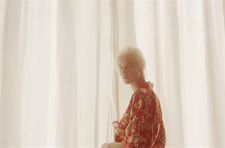 |
| Dimitri de Clercq: “The whole film was really made only with what I call the light of God.” |
AKT: The first shots in the car we don’t know what is up and what is down. Maybe you remember Fred Astaire dancing up the walls and on the ceiling in Royal Wedding to “You’re All the World to Me”. It’s a great start to keep us on our toes.
DdC: Yes, you’re totally disoriented in that. That wasn’t written in the script, that came in the editing process. That cut where you go from her opening her eyes to, like you say, the shot in that car.
AKT: Then some of the desert shots are John Ford with decomposing camels. The cinematography is stunning and surprised me often.
DdC: I must say, I worked with this young Belgian DP called Stijn Grupping. I had met him on a previous film shoot. The whole film was really made only with what I call the light of God. No artificial lighting at all. A lot of the scenes are shot at the Malick hour, dawn or dusk.
AKT: The moment with the hand, where we don’t know if this is her hand or someone helping her! Great shot! Let’s talk about the subject matter. It is the doctor who gives the male protagonist the idea of what follows when he says “Your wife is still in shock.” That moment is similar to The Talented Mr. Ripley taking the chance to be someone else. Or the origin story of Don Draper of Mad Men. But the big difference is that these men do it themselves by inventing another identity, whereas your character does it to the woman.
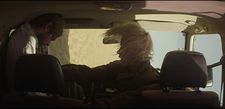 |
| Dimitri de Clercq on the scene with Delfine Bafort in the car after the accident: “Yes, you’re totally disoriented in that.” |
DdC: That’s interesting. I like that moment a lot. When we discussed that with Rosemary - because she came up with that idea that it’s actually the doctor [Abdel Jalil Zerououl] who plants it in Jake’s head. I saw it without that and Rosemary was like “Dimitri, you can’t do that! Because then Jake is just this …” I agree it’s more interesting this way. It starts to spin in his head.
AKT: It’s fishing. Does he take the bait or doesn’t he? Of course he goes for it. I think it’s very necessary to have that moment because of what happens in the end. What about the Hello Kitty watch?
DdC: The whole Kitty thing, came from the name and then Rosemary again is the one who brought that element into the film.
AKT: The idea of identity and the mythology of the changeling came to mind. I don’t know if you’ve read Javier Marias’ latest novel Berta Isla, where a woman is convinced that her husband who is working for a secret service, is not actually her husband when he returns from a mission.
 |
| Dimitri de Clercq: “What’s great about working in Morocco is that primary colors are not so present or they’re minimal.” |
DdC: Interesting, no, I don’t know it.
AKT: Kitty is strangely grounded in herself, despite having the lies told to her. Can you talk about working with Delfine on that? She is great in portraying this.
DdC: The theme of identity which is at the heart of the film, is something I have been fascinated with, especially in film. A film I like very much is Antonioni’s The Passenger. Delfine is really the inspiration. If I hadn’t met Delfine on this previous shoot of the film I produced before [Felix van Cleeff’s Eventide], this film wouldn’t exist. She gave me the desire to want to make my own film and to work with actors. I was always a little bit terrified of the idea of working with actors.
AKT: Why do you think that is?
DdC: Because I thought they’re difficult, I don’t want to deal with their egos, I don’t have the patience for this.
AKT: You’ve read too many interviews with Hitchcock.
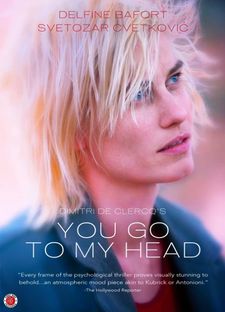 |
| You Go To My Head poster |
DdC: Right! But I think she really liberated that in me. Plus I wanted to work with a very small crew. The crew is really only four people, besides me and the actors. Delfine knew I had those feelings for her and she had one condition, she said “You need to write a script.” Because that film where we met was made without a screenplay, which can be very difficult for actors. So I came up with this idea with my friend Matt [Steigbigel]. Some of the inspiration came from my passion for Sam Peckinpah films and that whole moral ambiguity.
AKT: You are less violent, no?
DdC: The first draft I wrote with Matt was much more gritty, graphic, violent and I realized that I didn’t really have the time or the means to do that. It became less graphically violent but I think the violence is still there in the film.
AKT: Oh yes, if somebody tells you you’re their spouse and you’ve never met them before, that’s pretty violent in anybody’s book.
DdC: Exactly. After Delfine read the script, she looked at me and she said: “Dimitri, you are so crazy!” She often talks about her working relationship with Vincent Gallo. She made a film with Gallo that she likes a lot. I asked her, “Delfine, who’s crazier, Vincent or me?”
AKT: Which film did she make with Gallo?
DdC: It’s a film which was never released in cinemas because he pulled it from circulation. Promises Written in Water - it was shown in Venice and Toronto. It’s the last [feature] film he actually did. I never saw the film.
AKT: And are you crazier than Vincent Gallo?
DdC: She said: “You are definitely crazier than Vincent Gallo.” Because she realized how personal it was. I had written this film for her, plus at that time, I had told her that I was going to play the lead. When the shoot was postponed for weather reasons, because it was getting too warm in Morocco, and it was postponed for a year, she said: “You’ve got to find an actor.” And she was right. It was a miracle that I found Svetozar [Cvetkovic].
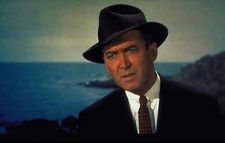 |
| Dimitri de Clercq: “There’s that whole Vertigo element. Me, the filmmaker, I am like the Jimmy Stewart character.” |
AKT: He’s very good. Did you tell her [Delfine] what her favourite perfume was?
DdC: Well, it’s the one in the film! You see the bottle. Of course it was personal.
AKT: It goes very far when he tells her what her favourite perfume is! The costumes were well chosen. From the red dress at the start to the way he is beginning to dress her. There was no Vertigo grey suit because that wouldn’t work in Morocco. It’s very interesting that he puts her into a cheongsam that she doesn’t even know how to button up.
DdC: The whole movie is extremely minimal and I wanted the colours to play a role. You don’t have that much control over things. Who has the means today to, like Antonioni, re-paint fields in green? What’s great about working in Morocco is that primary colours are not so present or they’re minimal. You can choose the colours. With the house we were really working with white and the element of red for me came with Delfine. In the film where I met her, she was wearing that red dress which she brought herself. I asked her to be able to use the dress again for this film. Which again - there’s that whole Vertigo element. Me, the filmmaker, I am like the Jimmy Stewart character. I was recreating things which I had lived. Then I worked with the costume designer in Paris, Marielle Robaut. I approached this film very much in a painterly fashion. There’s a side of me that made this film like a Jackson Pollock painting.
 |
| Dimitri de Clercq's You Go To My Head opened at the Quad Cinema in New York on Valentine's Day, 2020 Photo: Anne-Katrin Titze |
AKT: In the end credits I noticed a special thanks to your supervising editor, who did many of Catherine Breillat’s films.
DdC: Pascale Chavance, yes. A few years ago she was working on a film by a Palestinian filmmaker I worked with. When I was making this film she didn’t have the time to cut the film, so I worked with a young editor in Germany, Tobias Beul. It was his first feature. So I would go and cut in Munich, then come back to Paris. As it progressed I would show Pascale the different edits and she would make all these comments and remarks. She brought a lot of interesting feedback on how to condense certain things.
AKT: She did remarkable edits in Catherine Breillat’s films, Abuse of Weakness or Bluebeard, for instance.
DdC: It was interesting to have another pair of eyes. The first fine cut was about two and a half hours long and we took it to an hour and fifty.





















